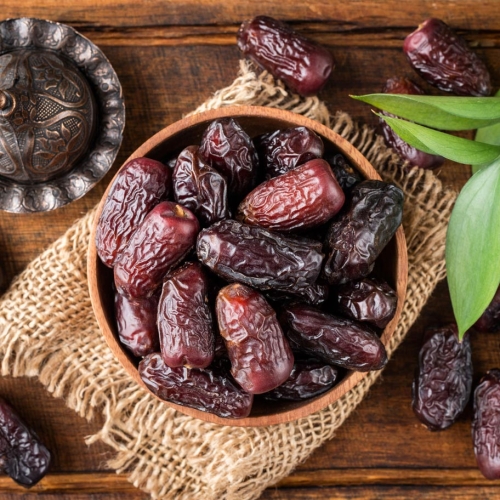Summary
Health benefits associated with dates include:
- Nutrient-dense: Dates are a good source of essential nutrients like fiber, potassium, magnesium, and antioxidants.
- Digestive health: The fiber content in dates promotes healthy digestion and can help prevent constipation.
- Energy boost: Dates are high in natural sugars, making them a quick source of energy and a good pre or post-workout snack.
- Heart health: Dates are low in fat and sodium and contain potassium, which may contribute to heart health by helping to maintain healthy blood pressure levels.
- Bone health: Dates contain minerals like calcium and magnesium, which are important for maintaining healthy bones and preventing osteoporosis.
To learn more about the health benefits of Dates, I encourage you to continue reading.
What are Dates?
Dates are sweet fruits that grow on date palm trees, scientifically known as Phoenix dactylifera. They have a chewy texture and a rich, caramel-like flavor. Dates are one of the oldest cultivated fruits and have been consumed for thousands of years.
Origin of Dates
The origin of dates can be traced back to the Middle East, particularly the region spanning from Iraq to Egypt. They have been cultivated in the Arabian Peninsula and North Africa for centuries. Dates were spread to other parts of the world through trade and colonization.
Countries in Africa where Dates are grown
In Africa, dates are grown in several countries with suitable climates. Some of the current countries in Africa where dates are grown include:
Egypt, Tunisia, Algeria, Morocco, Sudan
Physical and visual characteristics of dates
1. Shape and Size: Dates have an elongated shape and vary in size depending on the variety. They can range from small to medium or large.
2. Skin: Dates have wrinkled, glossy skin that can be amber, brown, or black in color.
3. Flesh: The flesh of dates is soft, sticky, and chewy. It is usually a pale amber or golden color.
4. Taste: Dates have a sweet, caramel-like flavor with varying degrees of richness and a hint of natural sweetness.
There are numerous varieties of dates found worldwide, each with its own unique characteristics. Some common varieties include:
1. Medjool: Medjool dates are known for their large size, soft texture, and rich, sweet flavor. They are often referred to as the "king of dates."
2. Deglet Noor: Deglet Noor dates are medium-sized with a firm texture. They have a slightly drier and less sweet flavor compared to Medjool dates.
3. Zahidi: Zahidi dates are small to medium-sized with a golden color and a firm, chewy texture. They have a sweet and slightly nutty flavor.
4. Khadrawy: Khadrawy dates are soft and moist with a dark brown to black color. They have a rich, caramel-like flavor.
5. Barhi: Barhi dates are small to medium-sized and have a yellow to amber color. They have a soft, creamy texture and a sweet flavor.
Nutrition
The nutritional benefits of a 100g serving of dates include:
1. Calories: Approximately 282 calories.
2. Carbohydrates: Provides around 75 grams of carbohydrates.
3. Fiber: This contains about 8 grams of dietary fiber.
4. Potassium: Provides approximately 656 mg of potassium.
5. Magnesium: Contains a moderate amount of magnesium.
Health benefits of eating dates
Dates are nutritious.
Since they’re dried, their calorie content is higher than most fresh fruit. The calorie content of dates is similar to that of other dried fruits, such as raisins and figs
Most of the calories in dates come from carbs. The rest are from a very small amount of protein. Despite their calories, dates contain some important vitamins and minerals in addition to a significant amount of fiber. Dates are also high in antioxidants, which may contribute to many of their health benefits
SUMMARY
Dates contain several vitamins and minerals, in addition to fiber and antioxidants. However, they are high in calories since they are dried fruit.
High in fiber
Getting enough fiber is important for your overall health.
With almost 7 grams of fiber in a 3.5-ounce serving, including dates in your diet is a great way to increase your fiber intake
Fiber can benefit your digestive health by preventing constipation. It promotes regular bowel movements by contributing to the formation of stool
Furthermore, the fiber in dates may be beneficial for blood sugar control. Fiber slows digestion and may help prevent blood sugar levels from spiking too high after eating
For this reason, dates have a low glycemic index (GI), which measures how quickly your blood sugar rises after eating a certain food
SUMMARY
Dates are high in fiber, which may be beneficial for preventing constipation and controlling blood sugar.
High in disease-fighting antioxidants
Dates provide various antioxidants that have a number of health benefits, including a reduced risk of several diseases.
Antioxidants protect your cells from free radicals, which are unstable molecules that may cause harmful reactions in your body and lead to disease
Compared to similar types of fruit, such as figs and dried plums, dates appear to have the highest antioxidant content
Here’s an overview of the three most potent antioxidants in dates:
Flavonoids: Flavonoids are powerful antioxidants that may help reduce inflammation and have been studied for their potential to reduce the risk of diabetes, Alzheimer’s disease, and certain types of cancer
Carotenoids: Carotenoids are proven to promote heart health and may also reduce the risk of eye-related disorders, such as macular degeneration
Phenolic acid: Known for their anti-inflammatory properties, phenolic acids may help lower the risk of cancer and heart disease
SUMMARY
Dates contain several types of antioxidants that may help prevent the development of certain chronic illnesses, such as heart disease, cancer, Alzheimer’s, and diabetes.
May promote brain health
Eating dates may help improve brain function.
Laboratory studies have found dates to be helpful for lowering inflammatory markers, such as interleukin 6 (IL-6), in the brain. High levels of IL-6 are associated with a higher risk of neurodegenerative diseases like Alzheimer’s
Additionally, other studies including animal studies have shown dates to be helpful for reducing the activity of amyloid beta proteins, which can form plaques in the brain
When plaques accumulate in the brain, they may disturb communication between brain cells, which can ultimately lead to brain cell death and Alzheimer’s disease
One animal study found that mice fed food mixed with dates had significantly better memory and learning ability, as well as less anxiety-related behaviors, compared to those that did not eat them
The potential brain-boosting properties of dates have been attributed to their content of antioxidants known to reduce inflammation, including flavonoids
However, more human studies are needed to confirm the role of dates in brain health.
SUMMARY
Dates may be helpful for lowering inflammation and preventing plaques from forming in the brain, which may be important for preventing Alzheimer’s disease.
May promote natural labor
Dates have been studied for their potential to promote and ease late-term labor in pregnant people.
Eating these fruits throughout the last few weeks of pregnancy may promote cervical dilation and lower the need for induced labor. They may also be helpful in reducing labor time
Although eating dates appear to help promote labor and reduce labor duration, more research is needed to confirm these effects.
The role dates may have in pregnancy is likely due to compounds that bind to oxytocin receptors and appear to mimic the effects of oxytocin in the body. Oxytocin is a hormone that causes labor contractions during childbirth
Additionally, dates contain tannins, which are compounds that have been shown to help facilitate contractions. They are also a good source of natural sugar and calories, which are necessary to maintain energy levels during labor
SUMMARY
Dates may promote and ease natural labor for pregnant people when consumed during the last few weeks of pregnancy.
Natural sweetener
Dates are a source of fructose, which is a natural type of sugar found in fruit
For this reason, dates are very sweet and also have a subtle caramel-like taste. They make a great healthy substitute for white sugar in recipes due to the nutrients, fiber, and antioxidants that they provide.
The best way to substitute dates for white sugar is to make date paste, as in this recipe. It is made by mixing dates with water in a blender. A rule of thumb is to replace sugar with date paste at a 1:1 ratio.
For example, if the recipe calls for 1 cup of sugar, you’ll replace it with 1 cup of date paste.
It is important to note that although dates are high in fiber and nutrients, they are still fairly high in calories and best consumed in moderation.
SUMMARY
Dates are a healthy substitute for white sugar in recipes due to their sweet taste, nutrients, fiber and antioxidants.
Other potential health benefits
People claim dates have a few other health benefits that have not yet been extensively studied.
Bone health: Dates contain several minerals, including phosphorus, calcium, and magnesium. All of these have been studied for their potential to prevent bone-related conditions like osteoporosis
Blood sugar control: Dates have the potential to help with blood sugar regulation due to their low glycemic index, fiber, and antioxidants. Thus, eating them may support diabetes management
Although these potential health benefits are promising, more human studies are needed before conclusions can be made.
SUMMARY
Some claim dates promote bone health and aid in blood sugar control, but these effects have not been studied sufficiently.
Easy to add to your diet
Dates are incredibly versatile and make a delicious snack. They are often paired with other foods, such as almonds, nut butter, or soft cheese.
Dates are also very sticky, which makes them useful as a binder in baked goods, such as cookies and bars. You can also combine dates with nuts and seeds to make healthy snack bars or energy balls, as in this recipe.
What’s more, you can use dates to sweeten up sauces, such as salad dressings and marinades, or blend them into smoothies and oatmeal.
It is important to note that dates are high in calories and their sweet taste makes them easy to overeat. For this reason, they are best consumed in moderation.
SUMMARY
There are many different ways to eat dates. They are commonly eaten plain but can also be incorporated into other popular dishes.
The bottom line
Dates are a healthy fruit to include in your diet.
They are high in several nutrients, fiber, and antioxidants, all of which may provide health benefits ranging from improved digestion to a reduced risk of disease.
There are several ways to add dates to your diet. One popular way to eat them is as a natural sweetener in various dishes. They also make a great snack.
It’s easiest to find dates in their dried form, though these are higher in calories than fresh fruit so it is important to eat them in moderation.
Dates are definitely worth adding to your diet, as they are both nutritious and delicious.


